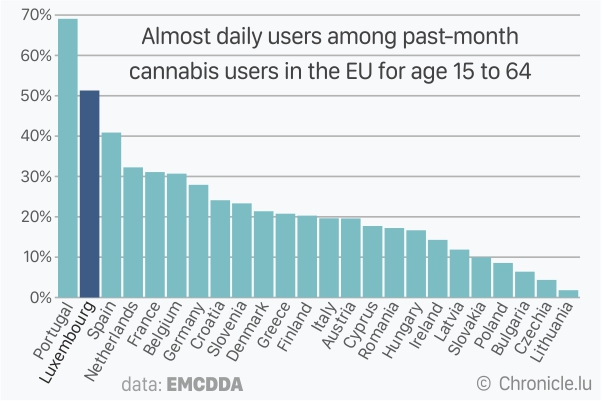
Medical cannabis prescribed by physicians to alleviate chronic pain or chemotherapy is legal in many countries and the legalisation of cannabis for non-medicinal and recreational use has garnered increasing support over the years globally.
On 22 October 2021, Luxembourg announced a proposal to allow adults aged 18 or older to use cannabis and to grow up to four plants per household. If this is passed by the Chamber of Deputies (parliament), Luxembourg will become the first country in Europe to legalise the production and consumption of cannabis.
Under the new proposal, the simple possession, consumption or transport of up to three grams of cannabis would incur a minimised fine of between €25 and €500 instead of a criminal fine of between €251 and €2,500. There would also be the possibility of a €145 warning fine under the new proposal, expediting the judicial process without inciting a criminal record. Above the three-gram threshold, the offender is considered a drug trafficker.
The legalisation and decriminalisation of cannabis is expected to reduce drug-related crime and black-market drugs trade.
It is also of note that 371kg of cannabis seizures (herbal and resin) were reported in Luxembourg in 2019, a 28-fold increase from just 13kg seized in 2011, according to the European Monitoring Centre for Drugs and Drug Addiction (EMCDDA), indicating an exceptional increase on the illegal cannabis market in Luxembourg.
The latest European drug report (2021) published by EMCDDA also showed that around 1.8% of adults aged 15 to 64 in the European Union (EU) were almost daily cannabis users, i.e. using cannabis on 20 or more days in the last month, most of whom (61%) were under the age of 35.
In terms of cannabis use among young people in Luxembourg, the Health Behaviour in School-aged Children (HBSC, 2018) report showed that 27.1% of young people aged 15 to 18 had used cannabis at least once in their lives and 13.3% used it at least once in the past month in 2018.
The Luxembourg National Drug Report 2019 further showed that 30% of young men aged 15 to 18 and 24% of women of the same age consumed cannabis at least once in their lifetime, while 16% of men had consumed cannabis in the last 30 days compared to 10% of women.
Furthermore, a Grand Ducal Police report confirmed that cannabis remained the most widely used illegal drug in Luxembourg in 2019, especially among young people aged 13 to 18, without specifying numbers.
In terms of specific groups, the National Drug Report showed that cannabis remained the most frequently used illicit drug, with 44.2% of "party-goers" reporting consumption in Luxembourg in 2018. 75.7% of the respondents reported residency in Luxembourg and the remaining said they were from neighbouring countries.
Adverse health risks like cannabis dependency are a risk among frequent users and adolescents in particular and may be aggravated by the legalisation of cannabis for recreational purposes. Daily or almost daily use of cannabis may be treated as a proxy for cannabis dependency.
Data from EMCDDA showed that half (51.3%) of cannabis users in Luxembourg aged 15 to 64 were almost daily users in 2019, the second highest percentage in the EU27.
The data shown above is representative of the share of almost daily users in the EU27 in 2019 or for the most recent year for which the data is available, except Estonia, Malta and Sweden for which no data is available.
In Luxembourg’s neighbouring countries, almost daily users constituted 31.1% of all cannabis users in France (2017), 30.7% in Belgium (2018) and 27.9% in Germany (2018).
It may be also noted that the European drug report (2021) showed that 51% of first-time entrants to treatment for cannabis in 2019 reported daily use of the drug in the last month, underlining cannabis dependency as a public health risk.
The principal psychoactive constituent of cannabis, Tetrahydrocannabinol (THC), averaged between 20% and 28% in the cannabis resin sold in Europe, almost twice that of herbal cannabis, noted the EMCDDA report. Commercially available cannabis is low in THC and so the illicit market may not be completely eradicated, especially for frequent users. Moreover, commercially available low-THC products may increase the risk for high-THC illicit products later in life.
Additionally, the legalisation of cannabis for recreational purposes in the United States (US) and Canada led to the increased availability of cannabis edibles and vaping products, thus increasing the risk of trying out the drug for first-time users.
Across the EU, the free movement of people and goods also means that isolated legislation(s) may not fully alleviate the situation for one member state, but instead a European Commission intervention providing pan-European legislative guidance would be desirable in the long term. Moreover, individual legislation(s) might grow into cannabis tourism hubs and need to be carefully deliberated.
Luxembourg presents an additional challenge with its high net purchasing power parity (PPP), meaning residents have relatively more disposable money for recreation, creating an opportunistic scenario for drug traffickers as well as the potential targeting of specific groups (see "party-goers" above).
In summary, while Luxembourg, and probably Malta as well, will soon legalise and decriminalise the recreational use of cannabis, the continued monitoring of cannabis sales and the usage among young people, as well as changes in drug-related offences, the THC-content of seized drugs, drug-related medical consultations and rehabilitations or treatments will be necessary and should be carefully planned in advance. Policies must also be adapted quickly, if needed, to avoid adverse public health risks, especially among young people.









